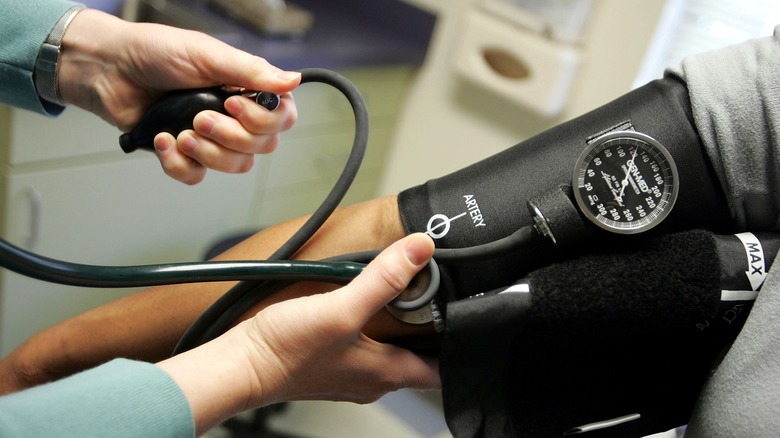14 Things You Didn't Realize Were Hurting Your Heart
Taking care of your heart is important, but there are some factors you might not even be aware of that increase your risk for developing heart problems.
Heart problems are more common than you may think. The leading cause of death in the United States is coronary artery disease, says the Texas Heart Institute. Cancer, which is the second leading cause of death, kills about half as many people.
Knowing your risk factors and cutting down on them in any way you can is important. Some things you can't change, but others are possible to fix through lifestyle changes like proper diet and exercise. There are two basic categories of risk: major and contributing. A major risk factor is something that's proven to directly increase your risk for a heart problem. Meanwhile, a contributing risk factor is something that can lead to a higher risk of heart disease. Lowering each type of risk can keep you safe and healthy.
Here are some of the things you didn't realize were hurting your heart.
High blood pressure
High blood pressure is a major risk factor in the development of cardiovascular disease. In fact, the Texas Heart Institute lists it as a form of cardiovascular disease.
When you see a doctor, they'll typically check your blood pressure, but you might not know how important it is for your heart health or why it can cause problems. A normal reading for adults is 120/80. The top number is also called the systolic blood pressure, while the bottom number is known as the diastolic blood pressure (via Healthline).
A paper published in Hypertension explains that blood pressure is the most important risk factor in the development of heart disease. It's linked to heart failure, stroke, coronary artery disease, and other problems like kidney disease and dementia. The authors explain that part of the reason why heart problems increase as you age is due to the fact that blood pressure also increases over time. They suggest that treating the increase in blood pressure from age could reduce the risk of heart problems as people age.
High LDL or low HDL cholesterol
As part of a routine physical or check-up with your doctor, they might ask you to do a blood test. There are a few numbers they check, all of which can be important for your heart health.
While there are many things they examine closely in such tests, a major concern is cholesterol levels. Cholesterol is a waxy substance, according to the Centers for Disease Control and Prevention (CDC). Your body actually makes cholesterol, producing it in the liver and sending it out into the bloodstream. You can also get cholesterol from food. If you make too much cholesterol, it can build up in your arteries and decrease blood flow to your heart, kidneys, and brain.
There are two types of cholesterol that your doctor will check: low-density lipoprotein (LDL) cholesterol and high-density lipoprotein (HDL) cholesterol. LDL cholesterol is also known as the "bad" cholesterol, explains MedlinePlus, because it can cause blockage in the arteries. Conversely, HDL is typically considered "good" because it helps remove cholesterol clogging your arteries. Your doctor might ask you to lower your LDL cholesterol levels, but they can also ask you to raise your HDL levels. Though it might seem counterintuitive, HDL cholesterol actually helps prevent heart disease, so more can be better.
Diabetes
Diabetes is a disease that affects your ability to regulate blood sugar. The National Institute of Diabetes and Digestive and Kidney Diseases explains that diabetics either don't make insulin — which regulates blood sugar — or the insulin they make doesn't work well.
While it might not seem like diabetes can damage your heart, the CDC lists it as a potential cause of heart disease. The agency explains that people with diabetes are at an increased risk for developing heart disease. Over time, high blood sugar levels can damage your arteries and other blood vessels that supply your heart with blood, says the CDC in a separate article.
High blood sugar can also damage the nerves that control your heart. Plus, diabetics are also more likely to have other heart risk factors such as high blood pressure and high LDL cholesterol levels. Diabetics should be particularly careful, and should check themselves regularly for potential risk factors of heart disease.
Being born male
Some risk factors of heart disease are difficult to control, and males are more likely to suffer from cardiac problems than females, according to the American Heart Association. Even after women hit menopause and their risk of death from heart disease increases, men are still more likely to suffer from a cardiac event.
A study published in BMJ Global Health further explores the differences in heart disease between men and women. The authors explain that men usually develop cardiovascular disease at a younger age than women. However, women are more likely to suffer from strokes than men. While men are more likely to suffer from heart problems even into older age, there has been a greater reduction in cardiac events in men than in women. Still, men should be careful to monitor the risk factors they can control (such as diet and exercise), because their cardiac risk is inherently higher.
Heredity and race
Heredity and race are risk factors that can't be changed. Children of parents who suffered from heart disease are at higher risk, says the American Heart Association. Race is also said to be a factor. For example, data indicate that African-Americans are more likely to experience heart problems than Caucasians. Mexican-Americans, Asian-Americans, American Indians, and native Hawaiians are also at an increased risk. The association attributes these disparities in part due to increased rates of obesity in these populations.
Part of the difference between populations could be due to income disparities, shows a paper published in JAMA Cardiology. The author explains that there is evidence that lower income increases the risk for cardiovascular disease and other health problems. People who experience large drops in income are at a higher risk for developing cardiovascular disease. Additionally, people who suffer a drop in income could have less access to medical care or experience stress due to their financial situation, which increases their risk for cardiovascular disease.
Poor mental health
Many of the risk factors associated with heart disease and other heart problems are physical. Making physical changes, such as increasing activity and eating a healthy diet, are important for lowering risk of heart disease. Another major factor in heart health is actually mental wellbeing. According to the Heart Foundation, mental health disorders increase your risk for heart problems. In fact, depression increases your risk as much as smoking and high blood pressure.
People who are experiencing mental health problems can have a hard time making healthy lifestyle choices. That might be why mental health problems increase your risk for developing heart disease. Taking care of your mental and physical health is important. Anxiety and depression are mental health issues that affect many people. More serious issues, such as bipolar disorder, are also a risk factor for heart health. Other things, like social isolation and work stress, are considered mental health problems.
If you or someone you know is struggling with mental health, please contact the Crisis Text Line by texting HOME to 741741, call the National Alliance on Mental Illness helpline at 1-800-950-NAMI (6264), or visit the National Institute of Mental Health website.
Your social environment
Where you live is considered one of the heart disease risk factors that you can't change. Some people are capable of moving, but many are tethered to their location by a job, family, or other restrictions. The Heart Foundation explains that a few factors can make a location bad for your heart health. The first is socioeconomic status. People in low socioeconomic areas are more likely to develop heart disease and suffer from a heart attack.
There are other important factors, such as limited access to employment. If there's a lack of job opportunities in your area, your heart health can suffer. A lack of health services is similarly dangerous for your heart. Some places lack access to healthy foods, which means that you're likely to have an unhealthy diet. These issues can manifest in your body as high blood pressure and cholesterol problems, which are bad for your heart.
Eating foods that are bad for your heart
Some of the foods you eat can be bad for your heart. Diet isn't the only risk factor when it comes to cardiovascular disease, but it's one of the easiest to change.
To make your diet more heart-friendly, you should cut out or limit some of the things you consume that are bad for your health. Sodium is one ingredient that you can cut down on, says an article from Harvard Health. Excess sodium intake contributes to almost 10% of cardiometabolic disease.
Processed meat is another type of food you should limit. Processed meats are any type of meat that's been salted, cured, smoked, or treated with chemical preservatives. Sugar-sweetened beverages should also be avoided. This includes soda and sports drinks alike. Interestingly, unprocessed red meat (such as steak and pork) is also a small risk factor. Aim to have less than 2,000 milligrams of sodium per day and less than 4 ounces of red meat per week.
Avoiding foods that are good for your heart
As important as it is to skip unhealthy foods, you should also try to add more healthy food to your diet.
Harvard Health lists some of the foods and food groups that can help keep your heart healthy. For example, research shows that people who didn't have enough nuts and seeds in their diet are more likely to experience cardiovascular disease than skipping any other type of food. As long as you're not allergic, you can eat nuts like almonds and cashews, as well as seeds such as sunflower seeds. Some granola recipes contain healthy servings of nuts.
Omega-3 fatty acids that come from seafood are also effective at protecting against cardiovascular disease. Certain types of fish contain more than others, so check the nutrition facts on the food you buy. Vegetables and fruits are an important part of a healthy diet, and contribute to lowering cardiovascular disease. Whole grains are also healthy, and can come from things like bread or pasta. Finally, replace foods that contain saturated fats or high amounts of carbohydrates with foods high in polyunsaturated fats; this can reduce your risk of heart disease.
Some prescription drugs
Only a qualified medical professional can get you prescription medication. If you're prescribed a medication, you should take it as directed. Your doctor or pharmacist will warn you of any potential side effects.
Some drugs have cardiac side effects that can be dangerous, and it's important to be aware of them. The Winchester Hospital lists a few of these drugs. One class of medication that can cause problems is anthracyclines. They're used to treat cancer, but if used in excessively high doses or for too long, they can cause heart problems.
Another class of medication that can be dangerous is antipsychotic drugs. Some of them can cause your heart to beat irregularly or lead to a cardiac arrest or stroke. People who are at risk for a cardiovascular disease should be careful when taking non-steroidal anti-inflammatory drugs (NSAIDs). You should also avoid taking these kinds of medications for too long, as they can cause a cardiac event or increased blood pressure. Finally, some type 2 diabetes medications can cause an increased risk of heart attack or heart failure.
Taking illegal drugs
While there are some scenarios where a prescription drug can damage your heart, the chances are much smaller than with illegal drugs. When you take a prescription, the medication is regulated, and a doctor will make sure that you're taking all possible precautions to avoid side effects. When you take illegal drugs, you can't be certain of what you're taking or how much you should be taking.
Amphetamines are dangerous for your heart, says the Winchester Hospital. Some amphetamines come in the form of medication, while others are made illegally. Anabolic steroids, a drug designed for performance enhancement and muscle building, can lead to a wide variety of dangerous heart problems. Cocaine and crack are also bad for your heart. Club drugs, such as ketamine and ecstasy, are dangerous for your heart and can cause high blood pressure or heart disease. People who smoke are also at an increased risk for heart disease.
Drinking too much alcohol
One drug that's surrounded by some controversy is alcohol. There's some evidence to suggest that small amounts can actually be healthy for your heart, says Johns Hopkins Medicine. Red wine, for example, has a high amount of antioxidants, which can be healthy for your heart. There's also some evidence that you can increase your HDL levels with moderate amounts of drinking, although evidence isn't completely clear.
Moderate drinking, which counts as an average of one drink per day for women and two per day for men, might be healthy or might not. One drink can count as a 12-ounce beer or a 4-ounce glass of wine. Heavy drinking, however, is bad for your heart. There are many negative health consequences, including high blood pressure, heart failure, or stroke. You can even damage your heart muscle from drinking too much. Another problem with heavy drinking is that alcohol contains calories, and drinking too much can lead to weight gain, which is also bad for your heart.
If you or anyone you know is struggling with addiction issues, help is available. Visit the Substance Abuse and Mental Health Services Administration website or contact SAMHSA's National Helpline at 1-800-662-HELP (4357).
Performing extremely intense workouts
Exercise is beneficial for heart health, as long as you do it properly. The American Heart Association recommends at least 150 minutes of some form of cardiovascular activity per week. That could mean walking, jogging, swimming, or playing sports. If you engage in vigorous activities such as sprinting or interval training, you only need roughly 75 minutes of activity per week to boost heart health.
Some people struggle with finding the motivation to get to the gym and work out. On the other hand, some people can't seem to stop exercising. In an interview with the Cleveland Clinic, Dr. Tamanna Singh explains that prolonged strenuous activity can lead to atrial fibrillation, a potentially serious heart problem. However, Dr. Singh says that most people don't need to worry about the effects of intense exercise, since the benefits of exercise tend to outweigh the risks. Still, people who do extreme events such as ultramarathons should be aware of the risks of too much intense exercise.
Living in a polluted environment
If you live in a congested area with a lot of motorized vehicles and constant traffic, the noise might not be the only thing that affects you.
Pollution can actually damage your body, even if you don't realize it. According to the Environmental Protection Agency, certain pollutants can cause your blood vessels to age more quickly than they would in a less polluted environment. Particles or nitrous oxide in the air can cause a buildup of calcium in your coronary arteries, which supply blood to the heart. If too much calcium builds up, it can narrow the arteries that supply the heart with blood, which increases your risk for a stroke or heart attack.
This is important because it shows that there is a direct link between increased pollution and your risk for heart problems. Also, the effects are long-term: Living in a polluted area for a short amount of time won't necessarily cause heart problems, but over a long time, it can be very dangerous for a person's cardiovascular health.















